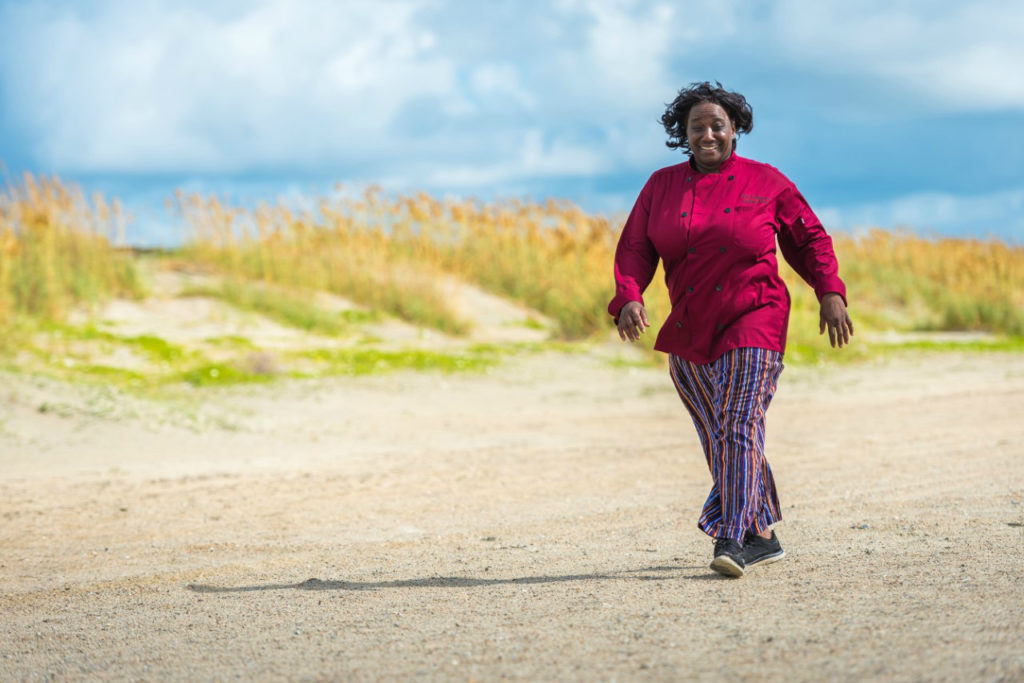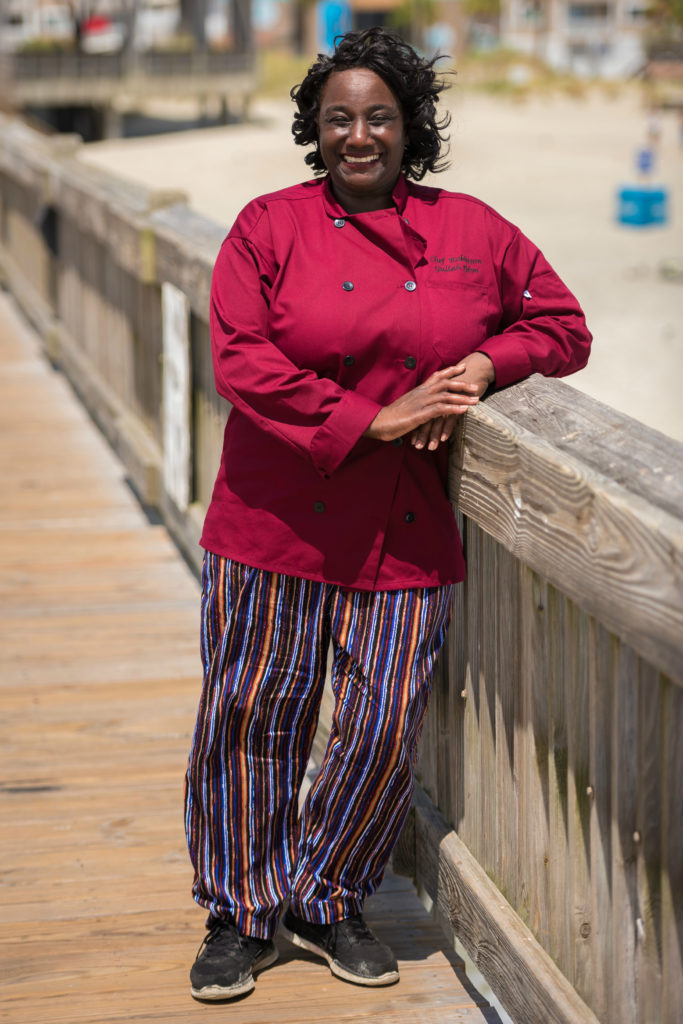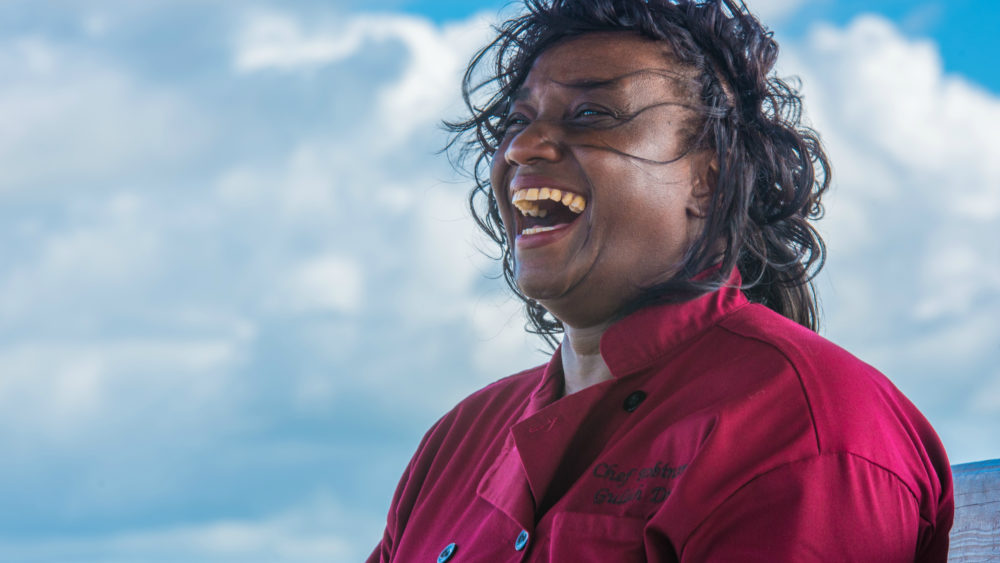Miss Sallie Robinson, cookbook author and celebrity chef, is sitting on a bench on Tybee Beach pier. She’s donning a wine red chef’s outfit with “Gullah Diva” imprinted on it and rainbow-striped pants, an ensemble a bit warm for the weather but just bright enough for her personality. A sunny summer day, the wind whips off the waves, throwing her wild black curls every which way. She laughs good-naturedly, and pushes them out of her face. The ocean her backdrop, she commands attention with a genuine smile and contagious bursts of happiness. We’re eager to hear her story.
Miss Sallie Robinson is a direct descendant of the Gullah Geechee, enslaved Africans who were brought to the New World and forced to work on plantations along the Lowcountry coast and neighboring sea islands. Due to the geographic barriers that secluded these sea island communities, the Gullah retained many aspects of their African culture including the Geechee language (a creole language rooted in English but with strong influences from their native Africa), arts and crafts, folklore, rituals, importance of familial bonds and of course, food.
The Gullah Geechee peoples’ traditional practice of farming, fishing, hunting, and preparing their food was carried on throughout the generations, all the way to Miss Sallie Robinson. Hailing from Daufuskie Island, a sea island located between Hilton Head and Savannah, Miss Sallie talks about life on the island, her history, her heritage and good Gullah food!
What was life like, growing up on Daufuskie Island?
Where do I start? Daufuskie was a very unique and beautiful place. Being born there was the best ever – I learned so much! I was one of five children, living with my mom and pop. Growing up, we didn’t have electricity or plumbing or grocery stores or food that was easily accessible – our food was based on the things we grew, raised, caught and picked. When we got up in the morning we knew that we had chores and animals that needed fed. We had a life that went from the moment we woke up until we finished in the evening. Our reward was relaxing around the table enjoying each other’s company with awesome food – the result of our labor. We shared these good things.

Daufuskie has taught me survival, it has taught me to be independent and do the things necessary to eat and to live.
What was it like moving from the island to the mainland? Was it a bit of a culture shock?
When I left the island to pursue a higher education, I left thinking that everyone lived the way we did and was in shock when I realized I was very wrong! Folks looked at me like I was crazy because I talked different. My parents were fluent in Geechee so I grew up on that language – people were bullies and they teased my way of talking and my way of living. I grew up on an island with no electricity and no plumbing, I talked strange and I came from a different way of life. This way of living was normal to me but very weird to them.
Coming from an Daufuskie to Savannah really made me want to go back home real fast! I wasn’t prepared for the fast life. I wasn’t prepared for the speed and everything with a button and a turn of the knob. Restaurants, grocery stores…everything was just there. I became kind of spoiled – spoiled with having everything at my fingertips. I started wondering, what if it wasn’t there, what if I couldn’t afford it, what would I do? Well, I decided I have to go back to the old ways. The ways of making due with what I had. Gathering and cooking.
So really, life away from home has made me want to go back home, in every way.
What sparked your interest in cooking?
My interest in cooking started from the time I could see over a stove! My mom would have us girls in the kitchen, one or two at a time, helping her. She always wanted us to do things the way she wanted it done. There were no shortcuts. She taught us to cook with patience, labor and love. Patience because, when you rush in the kitchen and cook without really wanting to, you’ll mess it up. But when you give it that love and that time and that labor, you can taste it. Love it and you’ll perfect it.
What does Gullah cuisine represent to you?
Gullah is a way of life. I try to explain to people that when you grow up on an island, a place that don’t have the grocery store, don’t have the special amenities, things that most people who live in the city can put their hands on instantly, you learn to labor. In the city, if they outta onion, they run to the store. On Daufuskie, our way of life was growing the onions.
Our way of life and the Gullah way was getting up every morning and preparing ourselves for the chores we had to do to make sure we had our breakfast, lunch, and dinner. The gardening, feeding the hogs, the cows, tending the field – whereas in the city where life is much faster, we run to the store. It amazed me that people were going to the store to buy shrimp. I’d say, “why you going to the store, the ocean is right out there! You can catch those very shrimp yourself!” I mean, how can you not have time for something so wonderful? And costly in the store? On the island, we ate it in abundance – fish, crab, oysters – the Gullah way was to go out there and catch it, prepare it and enjoy it. And you didn’t have an overhead or cost to go with it, except time.
And, of course, Gullah cuisine represents gooooood food!

What are some of your favorite dishes in Gullah cuisine?
This is a super hard question! My favorite dish is all the food I can cook!
I love ole’ ‘fuskie fried crab rice. It’s fresh picked blue crab, fried with onions, peppers and bacon, then stir fried. It is just so good. I haven’t found anyone yet who eat crab and don’t like it! I mean, people just have a love for it. Another favorite is the shrimp and potato salad. I know everyone has had potato salad but most people haven’t had it with the shrimp and it’s super good. Blackberry dumplins, bread pudding, sweet potato cornbread. Collard greens, mac ‘n’ cheese and fried chicken! Lima beans, all of my favorites. Squash, oh gosh. Seafood, fish, clam, oyster, oyster ‘n’ rice. Deviled crab the Daufuskie way. Oh and fried ribs! Fried baby back ribs, oh man. It’s the bomb! Some of you say, you can fry ribs?! Well, you can fry anything!
How does sustainability incorporate into your cuisine? Is eating local a priority for you?
For me, cooking fresh from the ocean is number one. I will go to the place where the shrimp boats and the crab boats come in because I know that these are fresh and local. So that is important to me. There are some things I really won’t purchase. I just won’t do it. Canned fish, fish I don’t know where it’s come from – I just won’t do it. It’s way different, especially for my palette. Canned, packaged, frozen, my choice is always the way I grew up because I’m stuck on the taste that I grew up with, stuck on the Daufuskie way – straight from the land and sea.
What last words of wisdom would you like to leave with our readers?
First of all, find the time. You want shrimp? Catch the shrimp, peel it and de-vein it, season it, cook it and then eat it! That’s the process and, I’m telling you, the labor is so worth it. People say, “nah, I ain’t got time!” Well, a lot of times making time is easier than you think! Stop thinking that it’s always too much to do because, by the time you take to argue the situation, you coulda done it! “Let’s go to McDonalds instead!” Well it took us 20 minutes at the window – it’s not fast food! I coulda made something by now! They need to change the name, ‘cause it ain’t fast!
Secondly, don’t ever go into the kitchen mad. If you mad, then stay out the kitchen ‘cause food know when you’re angry. Food knows it. It burns or something goes wrong because you’re not putting in the love and the focus and the dedication. Go in there happy. Don’t watch the clock. When I’m in there, I’m not worried about how long it’s gonna take – I’m just enjoying myself.
I have three fishing reels in my car at all times. I get the fresh fish out of the river, the sea. That’s so much better than going to the store. I put the love, the labor and the patience all into my cooking. Because you ain’t always gonna have money to buy food but if you learn how to fish, shrimp, crab, garden and cook you will always have food – and good food at that! Cooking will assure you will survive and live to enjoy the good things.
If you would like to learn more about Gullah Geechee heritage, please visit http://gullahgeecheecorridor.org/.


